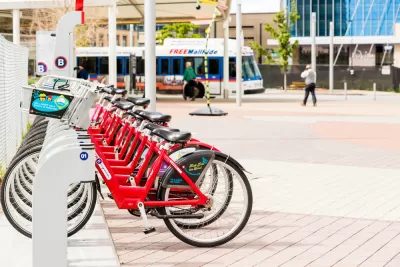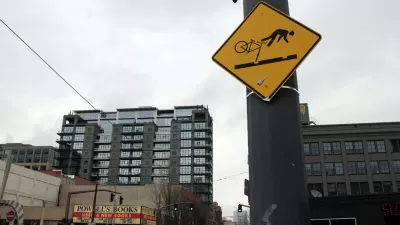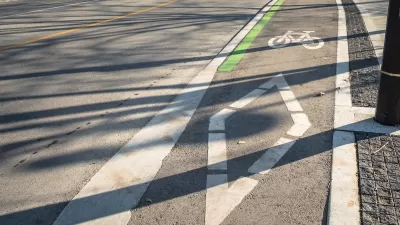Denver is in the process of rolling out a transportation experiment to the residents of the region: separating street space for transit and active transportation can serve all users and doesn't have to be the end of the world for drivers either.

Jon Murray checks in with the transportation situation on Broadway south of Downtown Denver, where last summer the city installed a two-way bike lane and removed a lane of vehicle traffic between Bayaud and Virginia avenues. According to Murray, Broadway funnels the heaviest traffic out of Downtown—about 32,000 drivers use the street every day. As "frustrating" as the changes have been for some rivers, writes Murray, the changes were welcomed by bike advocates and the change "is a signal of the future of commuting in Denver."
"As the city grapples with a surging population, intensifying traffic at all hours of the day and high demand for driving alternatives, public works officials increasingly are dividing up precious pavement, ending the decades of supremacy enjoyed by cars," according to Murray.
The pilot project on Broadway provides proof of concept, according to local transportation planners, that reducing traffic lanes doesn't necessarily slow travel times for cars, while it increases the potential capacity of the road. With evidence of the lane's success in serving all users (not just "auto-driving suburbanites," as Ken Schroeppel, an assistant professor in urban planning at the University of Colorado Denver, puts it in the article) in place, the city is preparing to expand the transit and bike lanes on the street.
FULL STORY: Denver’s commuter corridors, including Broadway, are no longer just for cars. Will that cause strife?

Planetizen Federal Action Tracker
A weekly monitor of how Trump’s orders and actions are impacting planners and planning in America.

Maui's Vacation Rental Debate Turns Ugly
Verbal attacks, misinformation campaigns and fistfights plague a high-stakes debate to convert thousands of vacation rentals into long-term housing.

San Francisco Suspends Traffic Calming Amidst Record Deaths
Citing “a challenging fiscal landscape,” the city will cease the program on the heels of 42 traffic deaths, including 24 pedestrians.

Defunct Pittsburgh Power Plant to Become Residential Tower
A decommissioned steam heat plant will be redeveloped into almost 100 affordable housing units.

Trump Prompts Restructuring of Transportation Research Board in “Unprecedented Overreach”
The TRB has eliminated more than half of its committees including those focused on climate, equity, and cities.

Amtrak Rolls Out New Orleans to Alabama “Mardi Gras” Train
The new service will operate morning and evening departures between Mobile and New Orleans.
Urban Design for Planners 1: Software Tools
This six-course series explores essential urban design concepts using open source software and equips planners with the tools they need to participate fully in the urban design process.
Planning for Universal Design
Learn the tools for implementing Universal Design in planning regulations.
Heyer Gruel & Associates PA
JM Goldson LLC
Custer County Colorado
City of Camden Redevelopment Agency
City of Astoria
Transportation Research & Education Center (TREC) at Portland State University
Jefferson Parish Government
Camden Redevelopment Agency
City of Claremont




























